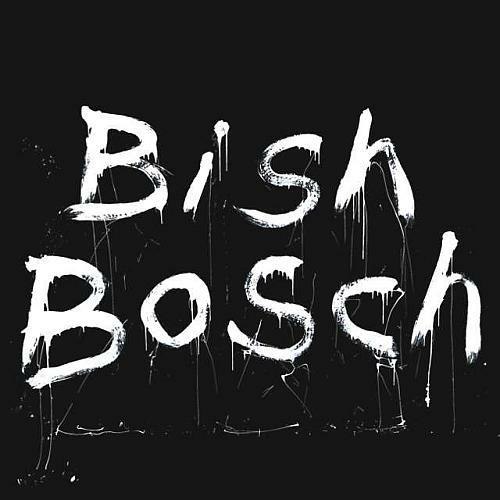We celebrate the end of the year the only way we know how: through lists, essays, and mixes. Join us as we explore the music and films that helped define the year. More from this series
10. Dean Blunt
The Narcissist II
[World Music Group/Hippos in Tanks]

“I can’t talk to you,” snarled the deeply frustrated, highly repugnant male subject of Dean Blunt’s The Narcissist II, before smacking his lover and tumbling into a mental morass of wheezing drone, wireless interference, and YouTube-compressed storm clouds. Upon reemerging, he found a troubling means of expression: self-reflexive “come hither” song sketches glued together by R&B cliché, but too ragged and paranoid to settle into any genre in particular. Here, songcraft congealed from artful escape into pathological avoidance, recentering the drama by way of co-opted language and mood, a comforting cloud of smoke blown at the bathroom mirror. But as the outside world intrudes — with violent narrative interjections, ringtone keyboard lines, the scraping whirr of a crusty apartment — that projected image warped and stretched to let through slivers of actual alienation. Blunt’s uncomfortable vocal delivery upped the tension, slipping from playful to sinister to desperate, hilariously confused but disturbing in context. On the sublime title track, at the singer’s lowest moment, he hurled out a strange request to “fold” her, some despairing desire trapped between fucking and holding, a smeared impulse left unresolved as the song washed away in a wave of canned critical applause. One of many bent transmissions from Hype Williams HQ in 2012, The Narcissist II may have been their most unusual and affecting infiltration yet.
09. YYU
TIMETIMETIME&TIME
[Beer On The Rug]

TIMETIMETIME&TIME was initially shocking for how painstakingly meticulous it was and how current and unabashedly hip its referents and sources were, embracing footwork’s skittering percussion, clipped vocal ghosts, and chopped-up twangs of acoustic guitar rather than the corporate pap of Beer On The Rug’s more well-known vaporwave releases this year. It was built on dance music’s core of repetition, yes, and wore its edits on its sleeve, but it joyfully avoided dance’s forward momentum — a gorgeous and purposeful surface at all times, but no cohesive trajectory, endlessly discursive and elusive. Its rhythmic underpinnings clattered in and out of formation as it followed inscrutable whims on odd tangents, memories of older loops appearing, transfiguring, disappearing, returning again in some mangled form. Certainly the least aggravating and most purely pleasurable of the label’s releases, YYU nevertheless seemed to invoke the same sort of intellectual fascination as vaporwave’s aggressively wretched material. It seemed to exist for some purpose or statement, but it even more so than the rest of the label’s work, figuring out what that might be proved close to impossible. After YYU, the loop and the edit were no longer firm and solid, but they proved just as transfixing.
08. Andy Stott
Luxury Problems
[Modern Love]

One of the most enduring kinds of music offers total immersion, an aesthetic world unto itself. An intangible place or headspace in which to while away some time, from which to return in some way enriched. Andy Stott’s Luxury Problems can lay full claim to this rare achievement: from the orbital vocal loops of “Numb” down to “Up the Box’s” mossy, terrestrial rhythms, the album was like an experimental techno circumbinary of Music For Airports, On Land, and all manner of interstellar debris in between. An evocatively textured and visually descriptive work, Luxury Problems was the most fully-formed microcosm presented by any one artist in 2012. Yet for all its atmospheric layers and tactile intricacies, it remained an unusually intimate listen. As if to center his most ambitious dub techno and “knackered house” abstractions to date, Stott’s widely noted use of his teenage piano teacher’s voice provided an emotional core half-hidden by both its title and its sonic palette. Allison Skidmore’s repurposed old a capellas served as warehouse operatics, textually ambiguous and obscured by echo, but nevertheless imbued with the deeply personal resonance of an artist returning to the woman with whom he began his musical studies, nearly 20 years later, to ask once more for guidance; to show her everything he’s learned.
07. Actress
R.I.P
[Honest Jon’s]

Much of the year’s best electronic music could be described as indeterminate, open-ended technoid soundscapes increasingly preoccupied with vertical elaboration over sequential composition. The possibilities opened up by Selected Ambient Works Vol. II and Burial have crystallized into an established lexicon for the post-bass underground, and no one pushed this aesthetic logic further than Actress. R.I.P dramatized the journey of the soul through the underworld with a series of baroque abstractions, piecing together a dark brocade of richly textured materials, an elaborate drapery profuse with a labyrinthine complex of shadowy folds. No other electronic artist this year was as fixated on the encounter between clarity and obfuscation, smoothness and erosion, the explicit and the implicit, and no other artist displayed as much talent and poise in bringing the drama of that encounter to life.
06. Macintosh Plus
Floral Shoppe
[Beer On the Rug]

For many of us here at TMT, 2012 was all about vaporwave. And in many ways, New Dreams Ltd., the umbrella moniker for Macintosh Plus, 情報デスクVIRTUAL, Laserdisc Visions, and Sacred Tapestry, embodied the genre best. Not only did it provide some of vaporwave’s most essential releases, but it also cannily folded at just the right moment, thanking us all for visiting the Virtual Casino. 2012 wasn’t just the year vaporwave broke; it was also the year it exhausted itself: morphed, rebranded, its practitioners moved on. If any single release deserves to be remembered, though, it is surely Floral Shoppe. From the very beginning, it stood out not only for its artful marrying of the conceptual with the sensual, but also for its performance of the inseparability between the two. Working with a particularly wide range of readymades, from R&B classics through glossy muzak to smooth jazz grooves, Floral Shoppe slid seamlessly between pure pop pleasure and the ironic framing of that pleasure, the presence of the artist at turns barely noticeable and dramatically foregrounded. This is the sound of a kind of sensuous virtuality, the artist as simulacra, both the experience and problematization of the post-human, a new cyber-pop unconscious.
05. Laurel Halo
Quarantine
[Hyperdub]

There’s an unlikely precedent for what Laurel Halo did on Quarantine: Neil Young’s Trans. The vocal abstractions Young created circa 1982 for one of his most critically maligned works was an attempt to connect with his young son who had cerebral palsy and was unable to speak. His use of vocoder allowed him a chance to make a human connection through electronic enhancement. Halo asserted in various interviews that, by removing the reverb from her vocal tracks, the objective was to add some humanity into her works of techno wonder. Instead, she managed to offend a lot of fans or would-be fans the same way that Young did. The amount of bile spewed forth via internet commentators over Quarantine’s vocals was staggering. The same amount of hatred is still piled onto Young’s album, but both works are bright, bold, and beautiful, sounding as if they were beamed in from a “post-human” future. Some people were not quite ready for Quarantine. A lot of us were.
04. Mount Eerie
Clear Moon / Ocean Roar
[P.W. Elverum & Sun]

Mount Eerie’s two releases this year were tethered tightly, but asymmetrically. Clear Moon’s emotionally-satisfying songs flowed into one another as naturally as lunar phases, weaving together a career’s worth of Phil Elverum’s previous strains of sound (Wind’s Poem’s black metal, Lost Wisdom’s spare folk, and even The Glow Pt. 2’s indefinably catchy layers) with some new ones (vocoders, drum machines, synths) to create his most precise and, well, clear statement yet. The nearly instrumental Ocean Roar took those same elements and seemed to make fragmentation instead of coherence, lopsidedness instead of balance, sound instead of a statement. Released first, Clear Moon’s structured gravity seemed to shape the unpredictable swells of Ocean’s tides. But eventually, I caught glimpses of Moon’s reflection in Ocean Roar’s uneven surface, too. It makes sense that Mount Eerie would happen to record its most and least coherent albums at the same time: “There is either no end/ Or constant simultaneous end and beginning,” Phil Elverum sings on Clear Moon’s “Through the Trees pt. 2.” It’s not that Elverum has so successfully reinvented himself twice this year; it’s that, again, he’s never had to.
03. Swans
The Seer
[Young God]

A bizarre paradox of the human condition: there is no experience of profound joy or pleasure that is not accompanied by pain. It’s unsurprising that Christian mystics frame religious ecstasy in violent terms, the flaming darts of St. John of the Cross or the golden spear of St. Teresa of Avila. It’s a joy that pierces, a joy that penetrates, a joy that overwhelms with its just-too-much-ness. Michael Gira has always aimed at capturing this rapturous state via the sheer sonic brutality of Swans, and in many ways, The Seer can be considered the culmination of those efforts. In its maddening dins and unnerving silences; in its thundering hammer blows and tender caresses; in its twisting, arduous passages that promised a fulfillment no frail human creature is sturdy enough to withstand, the record carved a rhythm that, for its near two-hour runtime, had the power to change one’s entire way of being. Like Gira’s parade of tortured mystics — lunatics, seers, warriors, apostates — we felt like we had brushed something vast and powerful, but not necessarily without cost. Swans used their profane tools to elevate us toward the sacred and showed us a path to ecstasy as severe as that of any monastic order.
02. Dean Blunt And Inga Copeland
Black Is Beautiful
[Hyperdub]

From the dark, slow burn of Andy Stott and Black Rain to the more elaborate gloomscapes of Raime and Demdike Stare, black was serious currency in the international dance underground of 2012. Typical, then, that perhaps the year’s most convincing celebration of the color came wrapped in a red sleeve, the cover text referencing African-American consumer culture rag Ebony (black, amirite?). But if that undermined blacker-than-thou pretensions elsewhere, the act of détournement itself sprung from another scene entirely: Dean Blunt and Inga Copeland started out performing thriftstore improv in small galleries, and although their Hyperdub deal surprised many, it didn’t stop them from diversifying their gallery portfolio as career outsiders peddling homebrew psychedelia. For some listeners, the joy of Black Is Beautiful was found in the diversity of its frame of reference — surely only one band can connect the dots between Bruce Haack, Mick Harris, Nami Shimada, and Billy Cobham while sounding like no one but themselves — yet of all the contradictions and paradoxes that keep Blunt and Copeland afloat, perhaps the likeliest is that, all posturing aside, they are not incompetents. They are just competent enough, flaunting a rare and bewildering equilibrium forged in the crucible of on-the-fly collaborative composition. Against all appearances, Black Is Beautiful was a matter of precision.
01. Scott Walker
Bish Bosch
[4AD]

Is it now safe to say that 2012 was a terrible year? Is it now safe to say that it was another terrible year in a string of terrible years? God, did you see what I saw? Running together, shuffled into one consumptive experience, the stories that we have left to tell are terrible things, indeed. Pink slime, drones, Trayvon Martin, Fifty Shades of Grey, Benghazi, Lana Del Rey, #Kony2012, Hurricane Sandy, Jerry Sandusky, McDonald’s’ Flavor Wars, James Holmes, bath salts, and cannibalism. Unity through “Gangnam Style.” Ecce Homo, mangled. The dark day behind us, the dark day ahead… Was there a better year for a new Scott Walker album?
I admit: a part of me sighed after Mr P assigned me Walker’s Bish Bosch. Had we even had time to digest it? (Yes, Ed did, obviously.) Most of us are still farting out words left and right, trying to grant some air of meaning to a work that is bigger, yes, bigger than we are at this moment in time. I’m not suggesting that Bish Bosch is incomprehensible. What I mean is that Walker is a world-builder, and you don’t so much listen to Bish Bosch as much as you wake up into its interpretation and wander around. While most of us haven’t had the time to get to know it well, the first steps have nonetheless been thrilling, enough to warrant its placement here, at the end, even as we are only beginning to understand its importance.
From what I can determine, Bish Bosch is important largely for what it isn’t: more sentimental garbage from another “old master.” Working from the absolute periphery of what can still be called the “folk process,” it’s totally at home in tradition, in passing-down, in relating then to now. Yet, unlike his cohorts, Walker does so without a waft of nostalgia; no, his stories are cyclones picking the past up into the sky, dropping bits and pieces as he goes along his way. What’s left is dumped into the present. Sorted, sort of. Walker is a storyteller at the end of storytelling, and he “spins his yarns” from a broken radio play, broadcast from history’s rubble: a remnant of the decaying oral tradition, howling like the anti-Garrison Keillor at the Cabaret Voltaire, letting disgusting sounds from bodies and instruments slither around words and utterances, letting them articulate their meaning when the words and speakers themselves are losing ground.
Bish Bosch is also important for what it actually is: a reclamation, and transformation, of the meaning of lived history. I remember reading that Joan Didion, after enduring a week in El Salvador in 1983 (eh, eunuch Ron?), had made her see Gabriel Garcia Marquez as a “social realist.” Spend some time in 2012 with Walker, and he too unfurls the surrealism of the real from the real. For Walker, history is a springboard for facts to launch off of, so that they might break apart in the atmosphere until the blunt truth of them remains. Whether or not they orbit or crash down is completely contingent upon the nature of the truth. So yeah, Walker’s factually wrong sometimes. Sure, his stories are fantastical, non-sequential, absurd. But can you listen to “SDSS14+13B (Zercon, A Flagpole Sitter)” and tell me that you’ve never turned into a brown dwarf? I know that nearly every day this year I woke up on the verge.
More significant than temporary importance, though, is what vitality Bish Bosch has lying in wait. What will propel Walker’s work forward — what will keep us listening beyond 2012, or 13, or 14 — is its comedic critique of the ruthless comedy that its world, our world, coheres to. The pitifulness of the pitiless. The rot and stench of the body, broken and broken down. History culminating in the questionnaire. The final, quasi-threatening words of wisdom: GTFO! That music is made with anything, everything, especially things that will kill you. That you make it anyway. That the story is finished slap-dash, and that it will nonetheless stand in judgement of a time and place that no longer really believed in judgement at all, but apocalypse. Honestly, I wonder if we’ll ever live to see the day that we’re actually done with Walker’s work.
So, maybe we only had a few weeks with Bish Bosch here at TMT, but for most of us, it only took a short time to discover how it could be possible that even our worst years (centuries, millennia, whatever) could be exposed, drained, re-/dis-figured, and recast/told/sung/farted/assassinated into a towering work of art. Bish bash bosh. The end. #yolo
50. Mykki Blanco - Cosmic Angel: Illuminati Prince/ss (Self-Released)
49. Raime - Quarter Turns Over a Living Line (Blackest Ever Black)
48. Belbury Poly - The Belbury Tales (Ghost Box)
47. INTERNET CLUB - VANISHING VISION (Self-Released)
46. Converge - All We Love We Leave Behind (Epitaph)
45. Arca - Stretch 2 (UNO NYC)
44. Fiona Apple - Idler Wheel (Epic/Clean Slate)
43. Killer Mike - R.A.P. Music (Williams Street)
42. Death Grips - No Love Deep Web (Self-Released)
41. Heat Wave - Fukd In Tha Game (Self-Released)
40. Lil B - White Flame (Self-Released)
39. ahnnu - pro habitat (WTR CLR)
38. Ian Martin - Mechanical Rain (Further)
37. Tame Impala - Lonerism (Modular)
36. The Men - Open Your Heart (Sacred Bones)
35. Burial - Kindred [EP] (Hyperdub)
34. Thee Oh Sees - Putrifiers II (In The Red)
33. Farrah Abraham - My Teenage Dream Ended (Farrah Abraham/MTV Press)
32. Motion Sickness Of Time Travel - Motion Sickness Of Time Travel (Spectrum Spools)
31. Jason Lescalleet - Songs About Nothing (Erstwhile)
30. Dolphins Into The Future - Canto Arquipélago (Underwater Peoples)
29. 情報デスクVIRTUAL - 札幌コンテンポラリー (Beer On The Rug)
28. Tim Hecker / Daniel Lopatin - Instrumental Tourist (Mexican Summer)
27. White Suns - Sinews (Load)
26. Sun Araw & M. Geddes Gengras Meet The Congos - Icon Give Thank (RVNG Intl.)
25. Mediafired - Pathway Through Whatever (Beer On The Rug)
24. Graham Lambkin - Amateur Doubles (Kye)
23. Angel Olsen - Half Way Home (Bathetic)
22. Demdike Stare - Elemental (Modern Love)
21. Aaron Dilloway - Modern Jester (Hanson)
20. Kendrick Lamar - good kid, m.A.A.d city (Top Dawg/Aftermath/Interscope)
19. Traxman - Da Mind Of Traxman (Planet Mu)
18. The Caretaker - Patience (after Sebald) (History Always Favours The Winners)
17. Daughn Gibson - All Hell (White Denim)
16. Death Grips - The Money Store (Epic)
15. DJ Rashad - TEKLIFE Vol. 1: Welcome to the Chi (Lit City Trax)
14. BEBETUNE$ - inhale C-4 $$$$$ (Self-Released)
13. Holly Herndon - Movement (RVNG Intl.)
12. Frank Ocean - channel ORANGE (Def Jam)
11. Grimes - Visions (4AD)
10. Dean Blunt - The Narcissist II (Hippos In Tanks)
09. YYU - TIMETIMETIME&TIME (Beer On The Rug)
08. Andy Stott - Luxury Problems (Modern Love)
07. Actress - R.I.P (Honest Jon’s)
06. Macintosh Plus - Floral Shoppe (Beer On The Rug)
05. Laurel Halo - Quarantine (Hyperdub)
04. Mount Eerie - Clear Moon / Ocean Roar (P.W. Elverum & Sun)
03. Swans - The Seer (Young God)
02. Dean Blunt And Inga Copeland - Black Is Beautiful (Hyperdub)
01. Scott Walker - Bish Bosch (4AD)

We celebrate the end of the year the only way we know how: through lists, essays, and mixes. Join us as we explore the music and films that helped define the year. More from this series
